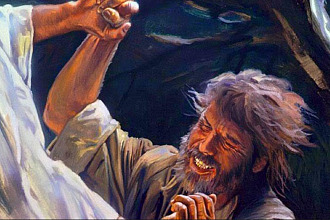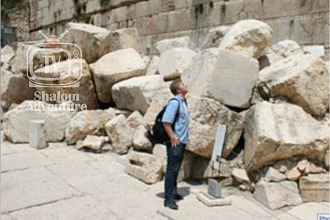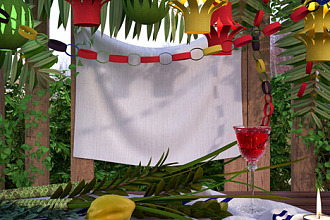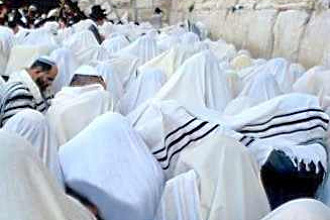As with each of the other Fall Holy Days, with Sukkot we look forward with eager anticipation to the future fulfillment of this Feast.
While exiled on the island of Patmos, the aged apostle Yochanan received the following revelation about the age of come:
Then I saw a new heaven and a new earth, for the old heaven and the old earth had passed away, and there was no longer any sea. Also I saw the holy city, New Yerusahalayim, coming down out of heaven from God, prepared like a bride beautifully dressed for her husband. I heard a loud voice from the throne say, "See, God's Sh'khinah is with mankind, and he will live with them. They will be his people, and he himself, God-with-them, will be their God. (Rev. 21:1-3, CJB)
When this occurs, the Holy Day of Sukkot will have reached its ultimate fulfillment, when God himself will finally dwell with his people in all his fullness.
Sukkot was instituted as a harvest feast, to celebrate the fruit crops for which the Israeli farmers had long awaited.
We too long for that Day when at long last the harvest of God's people will have reached its glorious fulfillment.
We see from the prophetic writings that there awaits a day "when it will no longer be said, 'As the Lord lives who brought the Israelites from the land of Egypt,' but, 'As the Lord lives, who brought and led the descendants of the house of Israel from the land of the north and from all the other countries where I [God] had banished them.' They will dwell once more in their own land" (Jer. 23:7-8, HSCB). Isaiah, in the 27th chapter of his book, describes this as the day when "you Israelites will be gathered one by one" (v. 12), the end of which will be their "worship [of] the LORD at Jerusalem on the holy mountain" (v. 13).
Therefore, Sukkot, "as the 'Day of Ingathering' of the harvest...prefigures the gathering together of the people...
Then all the survivors from the nations that came against Jerusalem will go up year after year to worship the King, the Lord of Hosts, and to celebrate theFestival of Booths [Sukkot]. Should any of the families of the earth not go up to Jerusalem to worship the King, the Lord of Hosts, rain will not fall on them. (Zech. 14:16-17)
In this glorious kingdom-to-come, the prophet says, both Jew and non-Jew alike--even many from the nations who had once contended with Jerusalem--will come and worship the King, Yeshua, in the Holy City. Sukkot, one of the three pilgrimage feasts that has been observed by Jews and God-fearing Gentiles for millennia (see Deut. 16), will on that Day be a joyful celebration commemorated by all of God’s redeemed from one end of the earth to the other.
Picture originally found here


























